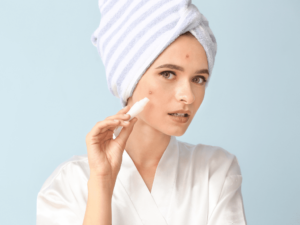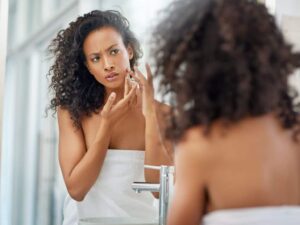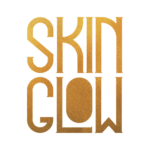Acne is a very common skin condition amongst teenagers. Acne skin is a broad term to describe clogged pores. Your pore can get clogged from a combination of dead skin cells, sebum (oil), and bacteria.
Non-inflammatory acne, such as blackheads and whiteheads, are a combination of dead skin and oil, while inflammatory acne has a bacterial component to it, causing cysts and nodules.
While acne skin can occur at any age, teenagers and young adults are more likely to get acne breakouts, thanks to an influx of hormones. This can feel overwhelming during a stage of life when you’re already experiencing a lot of changes, especially when you’re going back to school after holiday.
First, it’s important to know that you’re not alone. According to the U.S. National Institute of Arthritis and Musculoskeletal and Skin Diseases, a whopping 80 percent of young people experience acne skin breakouts before the age of 30.
Also, teenage acne tends to subside as you get older, and keeping up with good skin care habits can help a lot. We’ve got 10 ways to do just that.
10 tips for teenagers to prevent acne
- Benzoyl peroxide and salicylic acid
Benzoyl peroxide and salicylic acid are the two most common over-the-counter (OTC) acne treatments. Salicylic acid is commonly found in body washes, face washes, and astringents. You can sometimes find it in moisturizers, too. The purpose of salicylic acid is to get rid of the dead skin cells that can lead to non-inflammatory acne — again, these include whiteheads and blackheads.
On the other hand, benzoyl peroxide is a stronger treatment for more severe breakouts, including inflammatory acne lesions. Not only does it dry up dead skin cells, but it can also help fight excess sebum and kill acne-causing bacteria, too.
Since benzoyl peroxide is a strong ingredient, it can make your skin red and irritated at first. You may want to use these products once a day to start, and then gradually apply up to two times daily. Also, take care around clothing and coloured hair, as benzoyl peroxide is known to stain.
- Retinoids
Inflammatory acne that’s so common during your teen years may also be treated with retinoids. These are types of vitamin A derivatives that unplug clogged oil ducts to prevent cysts and nodules. Retinoids may be your next step if benzoyl peroxide doesn’t do the trick.
You’ll need to see a dermatologist for retinoids for acne skin, as these are available via prescription. Topical retinoids are the first choice. These come in the form of gels and creams that you apply up to twice a day. Examples include Retinol 0.3. You’ll need to be extremely cautious with sun exposure, as vitamin A can increase your skin’s sensitivity to UV rays.
-
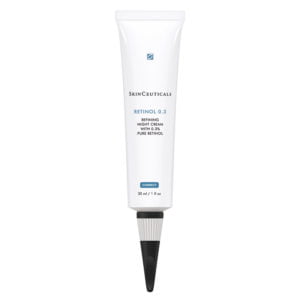 RETINOL 0.3£59.00
RETINOL 0.3£59.00
- Topical and oral antibiotics
Antibiotics can sometimes be helpful in occasional doses to help get rid of inflammatory acne that’s caused by the P. acnes bacterium. These can come in topical creams or gels that you apply for a certain number of days, as well as oral antibiotics.
It’s important not to overuse oral antibiotics, or else your body can build up a resistance to them. See your dermatologist for advice on whether your current breakout warrants antibiotic treatment.
- Don’t pick your skin
While you wait for your acne treatments to kick in, the waiting game can be frustrating. However, don’t give into the temptation to pick your skin or pop your pimples. Doing so can stretch out your pores, leading to pock marks on your skin. You may even cause permanent scars, which could end up being just as noticeable as the original pimples themselves.
Finally, popping cysts and other deep pimples can cause bacteria to get pushed into the skin even further, inadvertently leading to even more pimples. As hard as it is, your best long-term approach is to be patient as your acne treatment will do all the work for you.
- Use non-comedogenic products
Non-comedogenic facial products are necessary for acne-prone skin. These include face washes, moisturizers, and sunscreen, as well as any makeup you might wear. The term “non-comedogenic” means that the products won’t clog your pores — a product label will clearly state if this is the case. If it doesn’t, then it means that it’s comedogenic.
- Gently wash skin twice a day
You know that washing your skin is important in your overall acne care plan, but the frequency and technique is just as important.
Twice a day is ample. You may have to wash your face quick in the middle of the day after gym class if you get sweaty, but overdoing it can dry out your skin and lead to more breakouts.
After washing your skin, pat your skin gently with a clean towel. Rubbing it will irritate your skin and any pimples you have.
Warm water is also most effective in cleansing your skin. Hot water is too drying, while very cold water doesn’t do enough to help cleanse your skin properly.
-
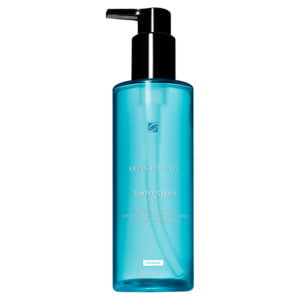 SIMPLY CLEAN£35.00
SIMPLY CLEAN£35.00
- Exfoliate once a week
Aside from morning and night washes, weekly exfoliation can also help keep acne breakouts at bay. A mud mask is ideal for all types of acne, as it helps unclog your pores and get rid of dead skin cells.

You may also consider gentle exfoliating treatments containing salicylic acid or alpha-hydroxy acids for the same effect.
- Wear sunscreen every day
While you might feel wary about applying more products to your skin, sunscreen is an absolute must. Not only does it help protect your skin from sun damage and cancer, but sunscreen may even help prevent acne that’s sometimes caused by sunburns.
It’s especially important to wear sunscreen if you’re using retinoids to treat your acne, as your skin will be more susceptible to burns.
Look for a product that’s labelled “non-comedogenic” and “oil-free.” You can even find two to one moisturizer/foundation products with sunscreen already in them to save time.
- Don’t wear bandages or tight clothing
It can be tempting to try to hide your acne behind bandages or tight clothing. However, this can aggravate acne by further trapping oils and bacteria into your skin.
Loose, cotton clothing is your best bet for acne. It’s also helpful to shower immediately after sports and other forms of exercise so you can keep your pores as clean as possible.
- Change your diet
A final consideration is your diet. Between school, extracurricular activities, work, and your social life, it can be challenging to eat right all the time. You may have also heard that foods don’t cause acne.
The truth is, though, that certain foods may contribute to acne breakouts. The greatest culprits are dairy, high-glycemic foods, and processed items.
Drinking water may also play a part in maintaining acne-free skin: The 2018 “Adult Acne Versus Teenager Acne” and the 2015 “Dietary water affects human skin hydration and biomechanics” studies showed that increasing daily water intake can help keep skin hydrated so that you won’t get an accumulation of dead skin cells.
Finding support
Acne can be challenging, so it’s important for teenagers to find the right support. As a parent, you can also be mindful of the way you’re supporting your teenager as they deal with acne.
Tips for parents
If your teenager is fighting severe acne, it’s important to take their concerns seriously and offer all the support you can. Avoid shrugging off their concerns and telling them that everyone gets acne, but instead let them know that you are there for them.
You can also help by reducing stress in your teen’s life, as this can contribute to acne, too. Also, look for signs of depression and let your teenager meet with the specialist alone if they are more comfortable doing so. There are many available efficient acne treatments that can help with acne, such as: microdermabrasion and hydradermabrasion, bespoke facials and chemical peels, microneedling, LED, laser resurfacing and other fractional systems. All of these treatments are available at SkinGlow Clinic.

General tips for teenagers
Severe acne can feel isolating and affect your confidence. It’s important to reach out to others who understand what you’re going through, as you are certainly not alone. Aside from parents and dermatologist, you can find others your own age via online support groups, such as forums.
The bottom line
Acne is a normal part of life. This is especially true as a teenager, when dealing with hormonal fluctuations that can further trigger breakouts.
Still, acne is treatable with the right skin care ingredients and routines. A specialist can also recommend stronger treatments if OTC methods fail to clear up stubborn breakouts.
If you’re feeling sad or isolated over your acne, it’s even more critical to reach out for support. Parents, dermatologist, or online support groups are a good start.
It’s also important to remember that acne does tend to get better as you get older. When you have healthy skin care and lifestyle habits too, then you’re off to an even clearer path in your future.






